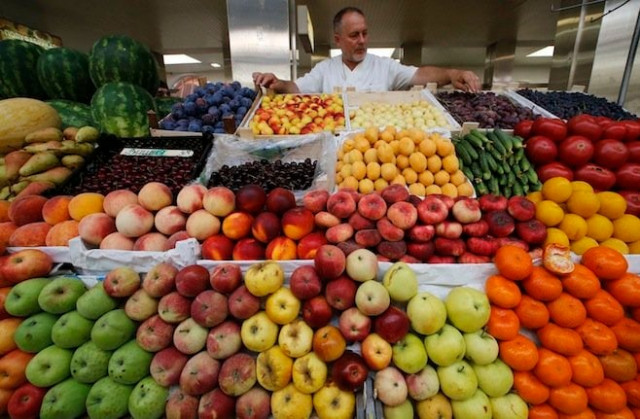Pakistan's fruit, vegetable exporters suffer $1.5b losses
Transporters strike enters seventh consecutive day

PHOTO: REUTERS
The government in its negotiations with the transporters on Saturday failed to convince them to call off their strike.
Around 1,400 containers carrying kinnows, potatoes and onions have not been able to reach the ports for their shipment abroad.
The strike has severely affected commercial activities within the country as containers arriving from other countries are piling up at ports.
Delivery of imported raw materials to factories has been affected, slowing down production.
“Our economy cannot afford a goods transport strike,” said Waheed Ahmed, the head of the Pakistan Fruit and Vegetable Exporters Association.
“The delay in the completion of export orders is likely to result in the cancellation of deals and new orders will be handed over to Indian exporters,” he added.
Ahmed pointed out that fruit and vegetables had a shelf life and had to reach buyers in time.
“Containers filled with kinnows, potatoes and onions are just lying on roads with nobody transporting them to the ports,” he lamented.
The association’s head demanded that the government should compensate the exporters for their losses.
“The government should implement an axle load law in consultation with the stakeholders.”
In a statement issued on Wednesday, Pakistan Hosiery Manufacturers and Exporters Association Chairman Jawed Bilwani said the strike was resulting in scarcity of transport vehicles and containers for the export-oriented industry, which was subsequently affecting shipments all over the country.
“The government seems to be nowhere and we, the exporters, suffer the most whenever the transporters go on strike,” he remarked and urged the government to take immediate notice and end the goods transporters’ strike.
According to the PHMA chairman, Karachi ports handled about 9,827 containers daily, including 4,665 export containers and 5,162 import containers.
He feared that if the strike was not called off, exports worth Rs10 billion could be affected on a daily basis, which would be a major blow to the government’s goal of enhancing exports to narrow the trade gap.
Recently, the National Highway Authority (NHA), which operates under the Ministry of Communication, increased the fines 10 times for rules violation, said United Goods Transport Alliance Chairman Ghulam Yaseen.
Citing an example, he said a previous fine of Rs500 had now been raised to Rs5,000.
The authorities were also making changes in the axle load conditions from time to time, which should be settled once and for all, he stressed.
“By imposing heavy fines, the authorities are not saving the roads,” he said. “The government should define standards for the axle load and stick to these.”
A 22-wheeler vehicle is allowed to carry 58.5 tons as per law, but the new axle load regime has restricted this limit to 32 tons for triple-axle vehicles.



















COMMENTS
Comments are moderated and generally will be posted if they are on-topic and not abusive.
For more information, please see our Comments FAQ